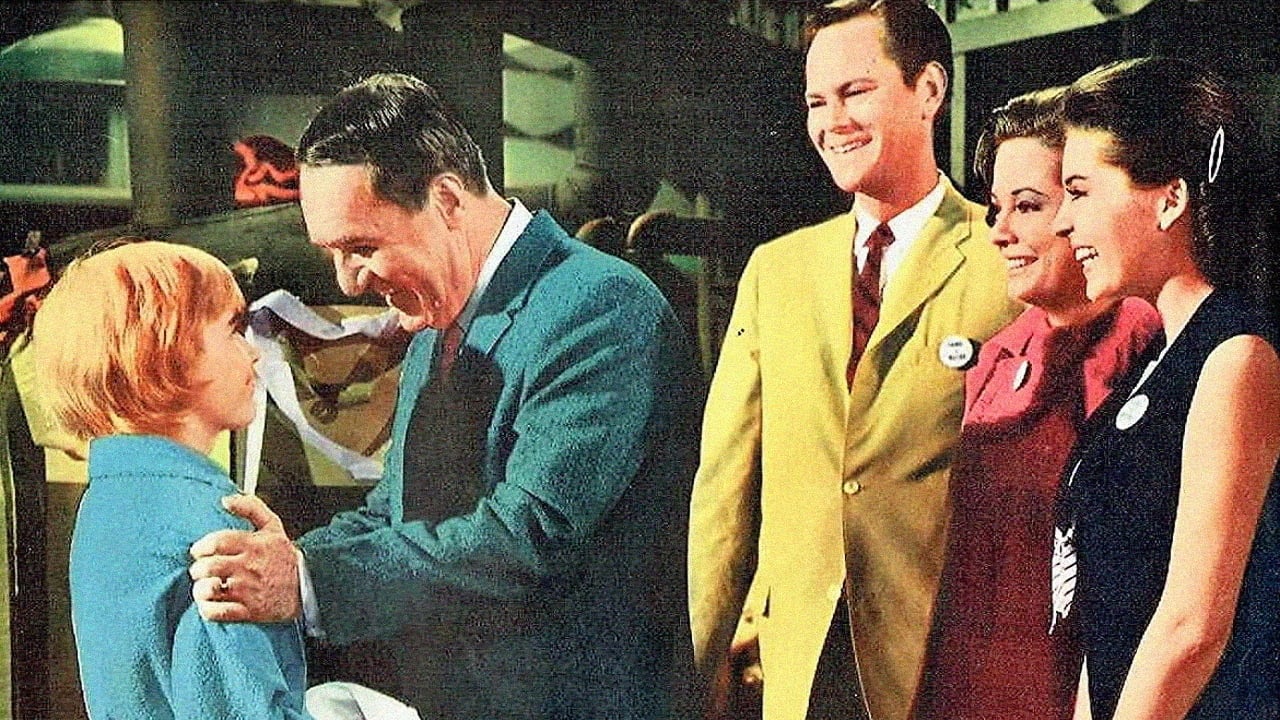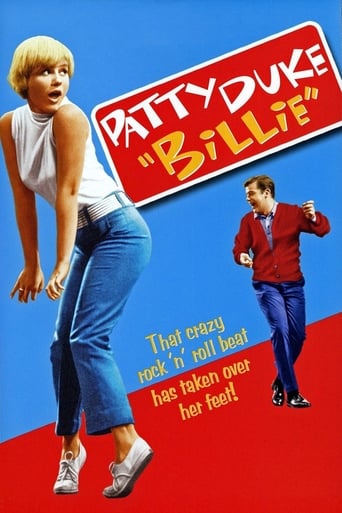ScoobyMint
Disappointment for a huge fan!
Comwayon
A Disappointing Continuation
KnotStronger
This is a must-see and one of the best documentaries - and films - of this year.
Neive Bellamy
Excellent and certainly provocative... If nothing else, the film is a real conversation starter.
Lee Eisenberg
This lighthearted comedy casts Patty Duke as a teenage girl who's really into athletics, much to the chagrin of her political office-bound father (Jim Backus). It's a little surprising that a pre-feminist movie was allowed to depict a girl who bests the boys at sports, but "Billie" does just that. The movie actually doesn't have much in the way of plain old comedy; it's more about how the daughter's ambition - coupled with the news about the older daughter (Susan Seaforth) - forces the family to reconsider their place in society. It's a fun romp, but nothing particularly special. Nonetheless, I really liked those scenes of Patty Duke dancing.As for the cast, one could describe it thusly: Helen Keller meets Thurston Howell meets the second Darrin (Dick Sargent) meets Mel Cooley (Richard Deacon) meets one of the primary character actors (Charles Lane). I don't know if Jane Greer had a most famous role.
earlytalkie
"Billie" was filmed during the hiatus between the second and third seasons of "The Patty Duke Show." This "Tomboy" comedy was based on a play, "Time Out For Ginger" which was filmed as a 1962 pilot starring Candy Moore, who would play Lucy's daughter in the early seasons of "The Lucy Show." This film, with it's innocent storyline about a teenage girl who can outrun any boy in the school could never be made today. Our jaded sensibilities would cry out "lesbian subtext" at the scenes where Billie, at an awkward stage, would wish she were a boy. A sentiment shared by her chauvinist father, played by Jim Backus. The cast is peppered with many familiar faces from 1960s TV, including Ted Bessell, Richard Deacon, Charles Lane, Dick Sargent and Billy De Wolfe. At this stage in Miss Duke's career the powers that be decided that she was to be a singing teen idol. She had a high-ranking song hit with "Don't Just Stand There" a few months before this film was released. Ms. Duke can't really sing. However, listening to her, there is something compelling in hearing her TRY. She is really doing her best, giving her small all to the pleasant, if dated songs in the picture. One more thing to mention in this film is the appearance of the marvelous Jane Greer as Billie's mother. The famous film-noir actress has some really good lines in this film, and she plays well with old-pro Jim Backus as her husband. It must have been a great temptation for the producers, the same ones who produced "The Patty Duke Show" to utilize William Schallert and Jean Byron, from the series, to play her parents. As it stands, "Billie" comes off almost as a pilot for a new Duke series to supplant "The Patty Duke Show."
Irie212
"Billie" was released when I was 15, and I only dimly remembered it, but because I admire Patty Duke's talents, and especially because I have in adulthood come to really appreciate Jane Greer's, I watched it again recently. It was all vaguely familiar, especially the horrible musical score, which came back to me like a bad headache. But there was no way, and I mean no freaking' way, that I could remember my 1965 reaction to "Billie," the story of a teen-aged tomboy. All I remember is Patty Duke, track and field, and bad music. Is "tomboy" even used any more? In the nearly half-century since "Billie" was made, Americans have been exposed to masculine girls from Cher in "Silkwood" to Ellen Morgan (a.k.a. DeGeneres) to Patty Bouvier. UPDATE, MAY 2017: Since I wrote that sentence, those choices seem almost quaint and old- fashioned. That's how far we've come from the days of a 'love that date not speak its name.'"Billie" could never, ever be made again in Hollywood. Any modern teen-angst movie about a tomboy would inevitably, in 2010, raise questions of homosexuality. Not that Billie is a Lesbian. Gee, gosh, and golly, no. There isn't even a suggestion of it. However-- and accuse me of profiling, if you will, because I am-- my gaydar was spinning like Brian Boitano the moment Duke sprinted onto the track field, looking for all the world like a pint-size peroxide Pete Rose.It's a formulaic movie, of course, and therefore pretty lousy, though Greer, Duke, Billy DeWolfe and Jim Backus all perform admirably. It's also a family movie, almost ridiculously so. In the end, not only does Billie end up with a boyfriend, but her mother and her sister both end up pregnant. Meanwhile, I couldn't help but wonder what teen-aged girls at the time-- future Lesbians such as Christine Kehoe and Janis Ian and Suze Orman -- thought when boyish Billie passionately admits "I wish I was a boy," only to have her father reply frankly, "So do I." It was a moving moment when Billie was just a tomboy to 15-year-old me; now that I view her as possibly a latent Lesbian, it was quite a powerful moment.
sonya90028
Patty Duke stars as young Billie Carol, the teenage gal who can outrun all of the guys on the school track team. She tells her track coach that the secret to her incredible running ability, is the rock music 'beat' that she hears in her head, whenever she runs. Billie's athletic talent, causes considerable controversy for her politician father, who's running for Mayor of their town. He admits that he wishes Billie had been a boy. Billie herself, also wishes that she was a boy. She doesn't like having to tone-down her athletic prowess, just because she's a girl.Lots of folks think that Billie should behave more like a girl, and quit the boy's track team. But she's determined to stay on. Her father reluctantly supports her wish to be on the boy's track team. To further complicate matters, Billie falls for one of her teammates, who she had been tutoring to improve his track skills. He's surprised to find himself attracted to the tomboyish Billie, and wants her to start acting like a girl. Billie likes him, but wants him to accept her as an equal. His male ego is threatened by the fact that Billie can outrun him, since she's 'just a girl'. Billie doesn't like this, but she also doesn't want to lose her first boyfriend. Bewildered by her blossoming romantic feelings for him, Billie knows that she needs to make some important decisions, regarding her relationship with him.This movie belongs to Patty Duke, and she shines above the others in the supporting cast. Patty looks like a cute puppy-dog tomboy, and brings an intense energy to her role as Billie. After this film, Patty would never again appear so baby-faced and innocent, as she did in Billie. Patty also got to sing songs in the film, and she does have a nice voice.This movie was a charming, fun comedy, about a girl's journey through adolescence. It was made before the women's rights movement got underway. But it's plot was supportive of Billie's determination, to compete on an equal level with the boys on the track team. It's a fun, 60s teen-angst movie, with a message about equal rights for girls.

